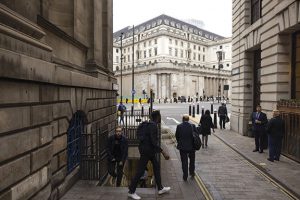Bloomberg
The Bank of England (BOE) plans to scrap rules introduced in the aftermath of the financial crisis designed to test whether borrowers could afford their mortgages in the event of significant interest rate rises.
The central bank’s Financial Policy Committee said it would withdraw the so-called affordability test from August 1,
according to a statement on Monday. The rule, introduced in 2014, requires lenders to test prospective borrowers ability to repay their mortgages in the event that rates rise to a specified stress level. The bank’s loan-to-income flow limit that keeps a lid on the number of borrowers with loan-to-income ratios above 4.5 times will stay in place, the BOE said in the statement.
The end of an era of rock bottom rates threatens to upend a UK housing market that was supercharged by the pandemic. The bank’s monetary policy committee raised the benchmark interest rate for a fifth successive time last week to 1.25% in a bid to reduce inflation.
“The Financial Policy Committee judged that the loan-to-income flow limit is likely to play a stronger role than the affordability test in guarding against an increase in aggregate household indebtedness and the number of highly indebted households in a scenario of rapidly rising house prices,†according to statement.
Borrowers will still be assessed under the Financial Conduct Authority’s wider lending rules on affordability. Taken together with the loan-to-income limits retained by the Bank of England, those rules “ought to deliver the appropriate level of resilience to the UK financial system, but in a simpler, more predictable and more proportionate way,†the central bank said in the statement.
The central bank’s strong line on the loan-to-income flow limit will disappoint some bank executives who would like the cap lifted. Under BOE rules, banks cannot lend more than 15% of their total mortgage book to borrowers looking for more than 4.5 times their annual income. Some would like it raised to 20%.
BOE May Seek to Recover QE Losses From Banks
The Bank of England will soon stop paying interest on commercial bank deposits in a move that could save the UK taxpayer billions of pounds but hammer profits among high street lenders, a leading analyst says.
Jonathan Pierce, UK banks analyst at Numis Securities, has argued that further interest rate rises will make it politically difficult to continue with the current BOE practice of paying “interest on reserves.†Doing so will amount to a payment from UK taxpayers to the banks.
Most bank analysts assume that the industry’s profitability will rise automatically with interest rates because UK banks have close to half a trillion pounds on deposit at the BOE. Those reserves are paid at the prevailing interest rate, currently 1.25%.
High street lenders are not passing on BOE rate rises to customers who have deposits. Instant access savings earnings less than 0.25%, BOE data shows.
Pierce said the risk of a policy shift that could hit bank profits is being underestimated in the sector. In his valuation models, he assumes the Treasury will intervene to make the BOE stop paying interest on as much as half of its almost £1 trillion of reserves.
The issue arises because BOE reserves exploded by £450 billion during the pandemic. Under quantitative easing, reserves are created to buy government bonds. The new money is then placed on account with commercial banks at the BOE. Those reserves are paid the interest rate.
The arrangement effectively swaps government bonds, on which the Treasury pays a fixed interest rate, for overnight deposits. Roughly speaking, as long as interest rates are below 2%, the Treasury makes money. Above 2%, it has to make transfers that end up at high street banks. At a time when the government is under pressure to find funds to support voters through a cost-of living crisis and deliver promised tax cuts, the prospect of a back-door raid on high street lenders’ profits may be tempting.
Analysis by both Bloomberg and the Office for Budget Responsibility has shown that the government will start making transfers from next year. If interest rates hit 3% by the end of this year, as markets now expect, the transfers will be even greater than expected.
Pierce’s thoughts, which are long held, were given fresh impetus by a report from the New Economics Foundation last week that showed the government could save as much as £15 billion a year by paying zero on reserves.
In a note, Pierce said the politics of making large transfers to banks could persuade the authorities to change reserves remuneration, which would have a “significant†impact on bank profits. He has taken a conservative approach to reflect his view that the “risk-reward is finely balanced.â€
The Treasury and the BOE have repeatedly said they have no intention to change the BOE reserves remuneration policy. Pierce pointed out doing so could have an impact on the City of London’s international competitiveness but he was skeptical about official arguments it would affect the monetary policy transmission mechanism.
 The Gulf Time Newspaper One of the finest business newspapers in the UAE brought to you by our professional writers and editors.
The Gulf Time Newspaper One of the finest business newspapers in the UAE brought to you by our professional writers and editors.
